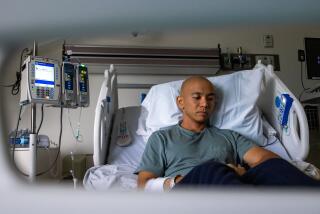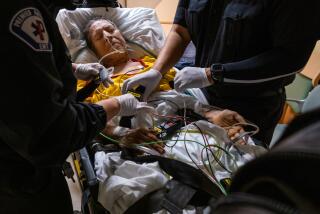3rd Hospital Refuses Man in Quest for New Heart
- Share via
NEWPORT BEACH — After being refused a heart transplant by a third Southern California hospital, Hector Bojado said Tuesday he may return to his native Mexico in hope of gaining a new heart.
Bojado, 29, who is destitute, has been formally turned down as a transplant patient by Hoag Hospital in Newport Beach.
Richard Haskell, the cardiologist caring for Bojado, said continued medical care is now his “only alternative,” and offered to continue treating Bojado as an outpatient.
In an interview Tuesday, Bojado said he remains determined to receive a transplant, and may try doctors in Mexico City, where relatives live.
“He (Haskell) will take care of me here, but I need a transplant,” Bojado said from his bed in Hoag. “He can’t give me a transplant.”
Earlier, medical centers at both UCI and UCLA also decided against taking on Bojado. The rejection by UCLA earlier this month noted that Bojado suffers from cardiomyopathy, a “weakness of the heart muscle, likely as a result of cocaine use,” said Dr. Lynne Warner Stevenson, a UCLA cardiologist on the team of heart experts who considered him for a transplant there.
Studies have shown that drug use in general, and use of cocaine in particular, damages the heart and connecting arteries. Each hospital has concluded that Bojado would be a high risk for failure.
Larry Ainsworth, executive vice president of Hoag, refused to comment on whether past substance abuse played a role in the decision by Hoag’s heart transplant committee.
“Hector has stated that he has had a cocaine problem. I cannot confirm or deny that,” Ainsworth said Tuesday, declining to elaborate.
Ainsworth said that the “very difficult decision” was made after four days of “thorough review” by a team of doctors, nurses, social workers and psychiatrists, and more than four hours of discussion by the hospital’s Heart Transplant Committee.
“You couldn’t pinpoint it on any given factor; there were several factors,” he said, adding that in general, chemical dependency is “obviously a major concern” in heart transplants.
“He’s gotten better since he’s been here, (but) he’ll never be normal,” said Haskell, who has been caring for Bojado since he arrived at Hoag last Thursday. “His long-term prognosis is not good, (but) I think we can help people feel better in the short run.”
Hoag’s decision, made Monday, ends more than six months of failed attempts to persuade U.S. medical authorities of Bojado’s need for a transplant.
Haskell said his own informal research had shown that the last transplant at a Mexico City hospital was in January, 1987. He estimates that 50% of patients with heart conditions as severe as Bojado’s live an additional year, but he didn’t rule out the possibility that with proper care Bojado could live up to five years.
Bojado was first denied by UCI because he lacked the funds to pay for the expensive operation, and because there were no family members to provide him with follow-up care. Next, UCLA refused the separated father of two, on the grounds that his past cocaine use presented a potential future health problem.
Ainsworth said the research team at Hoag made similar findings as the reports from UCI and UCLA indicated, but added that neither the money shortage nor lack of nearby family members was the basis for its decision.
“Either with a transplant or without a transplant . . . he was a high risk for failure,” Ainsworth said.
“If you transplant somebody and they screw up or don’t do well, you’ve wasted a precious commodity,” Haskell said. “We don’t do people because we like them or don’t like them; we base it on predictable future behavior, which is an inaccurate science.”
More to Read
Sign up for Essential California
The most important California stories and recommendations in your inbox every morning.
You may occasionally receive promotional content from the Los Angeles Times.














